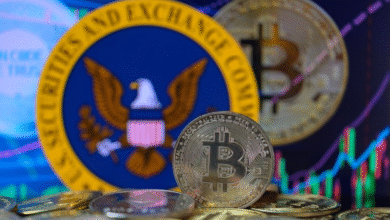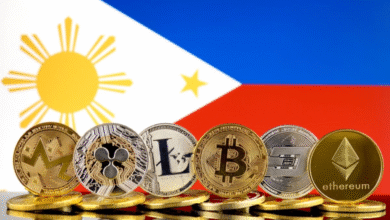Banco Santander Eclipses UBS as Europe’s Most Valuable Bank

In a striking development within the European banks market cap landscape, Banco Santander has eclipsed UBS, marking a significant shift in the banking sector. As of recent data, Santander commands a valuation of 91.3 billion euros ($103.78 billion), while UBS’s market cap has plummeted to 79.5 Swiss francs ($97.23 billion), largely due to the adverse effects of U.S. tariffs. This loss of supremacy has seen UBS share price suffer a staggering 17.2% decline year-to-date, in sharp contrast to Santander’s impressive 35% stock growth during the same period. These tariff-induced challenges have not only highlighted vulnerabilities within the banking sector but also positioned Santander as a resilient player amidst recession fears. The recent developments underscore the profound impact of U.S. trade policies on European banks, reshaping the competitive dynamics in an already fragile economic environment.
The recent shift in the hierarchy of European banks signifies a pivotal moment for the financial industry, with Banco Santander overtaking UBS as the continent’s leading bank in terms of market capitalization. This transformation has raised eyebrows, especially as UBS faces perilous conditions tied to global trade tensions and commodity tariffs that have greatly influenced its share performance. While UBS struggles, Santander capitalizes on strategic growth, showcasing a stark contrast in stock performance that reflects the broader economic climate in Europe. As we delve deeper into this banking sector scenario, we must consider the implications of these changes on investor confidence, financial regulations, and overall market stability in the wake of potential recessions.
Banco Santander Eclipses UBS in Market Value
In a significant shift within the European banking landscape, Banco Santander has officially surpassed UBS to become the largest bank in continental Europe by market capitalization. As of mid-April 2025, Santander’s market cap reached 91.3 billion euros, approximately 103.78 billion dollars, while UBS’s valuation plummeted to 79.5 Swiss francs, or around 97.23 billion dollars. This change underscores Santander’s impressive stock growth amid challenging economic conditions, where its shares have risen by nearly 35% over the past year, in stark contrast to the substantial 17.2% decline experienced by UBS.
The performance difference between these two banking giants can be attributed to various factors, particularly the impact of U.S. tariffs on their respective growth trajectories. As the trade policies imposed by Washington ripple through the European markets, UBS’s vulnerability has become apparent, significantly affecting its share price. Meanwhile, Santander’s relatively lower exposure to U.S. economic fluctuations has allowed it to capitalize on its operational strength in Europe, marking a pivotal moment in the competitive dynamics of these leading financial institutions.
Effects of U.S. Tariffs on European Banks
The imposition of U.S. tariffs has brought about a turbulent environment for many European banks, including both Santander and UBS. Initially set at 20%, U.S. tariffs on imports from the European Union were temporarily reduced to 10% in a bid to ease tensions, yet the long-term implications remain critical. The financial sector has struggled with declining growth prospects, and the looming threat of a recession in the United States raises further concerns. As these tariffs continue to create uncertainty, the banking sector’s market cap has taken a hit, pushing institutions like UBS to navigate unfavorable conditions more cautiously.
These protectionist trade policies have not only affected market valuations but also hindered strategic growth plans for European banks. UBS, particularly, has felt the sting of declining business confidence and rising operational costs due to the tariffs, which make it difficult to maintain profit margins and investor interest. On the flip side, while Santander has displayed resilience in the face of these challenges, it is not insulated from the broader consequences of a potential economic slowdown. The evolving landscape demands that both banks recalibrate their strategies to mitigate risks stemming from geopolitical tensions.
UBS Share Price Decline: Analyzing the Causes
UBS has seen a noteworthy decline in its share price as a direct impact of external economic pressures, particularly from U.S. tariffs. The bank’s share price fell significantly after the announcement of these tariffs, highlighting a loss of investor confidence amidst a turbulent market environment. The uncertainty surrounding potential new capital requirements and the acquisition of Credit Suisse further complicates its operational strategy. This combination of declining share prices and increased regulatory scrutiny has led investors to reevaluate their positions, raising concerns about UBS’s ability to recover in the foreseeable future.
The strong Swiss franc has also added another layer of complication for UBS. Its recent appreciation against the U.S. dollar, up by 8% since the tariffs were first imposed, poses challenges for profitability, as it constrains international revenue potential. Consequently, UBS may be forced to consider lower interest rates from the Swiss National Bank, which could exacerbate the negative sentiment surrounding its share price. As investors take stock of these developments, UBS faces the daunting task of regaining its competitive edge in an increasingly hostile economic landscape.
Santander’s Stock Growth Amid Economic Challenges
In contrast to UBS, Banco Santander’s stock performance has been a remarkable success story amidst the turmoil in the banking sector. With a stock price that has surged nearly 35%, Santander has managed to carve out a niche that acknowledges both its robust European operations and relatively lower exposure to the risks associated with U.S. tariffs. This positive trajectory has bolstered investor confidence, allowing Santander to solidify its position as continental Europe’s most valuable bank at this juncture.
The firm’s strategic focus on expanding its presence in the United States, especially as one of the largest auto lenders, may start to pay dividends, contributing to its overall profitability. Although U.S. profits currently represent only 9% of Santander’s total earnings, the proactive expansion strategy signals potential for greater growth. As the banking sector anticipates further economic adjustments, Santander’s stock growth reflects not only resilience but also an adaptive approach to overcoming challenges presented by protectionist trade policies.
The Banking Sector Recession: Navigating Through Tough Times
The looming recession within the banking sector is a result of multiple factors converging in the current economic landscape. The stress from U.S. tariffs has overshadowed growth prospects for many European banks. As institutions reevaluate their strategies, the need for liquidity, operational adjustments, and risk management becomes imperative. This environment of uncertainty is compelling banks to scrutinize their investments, lending practices, and operational efficiency, fearing the dips in market capitalization may signal broader financial health in jeopardy.
Navigating through these turbulent times will require both innovation and strategic risk management from the major banks. Santander and UBS must recalibrate their approaches to address changing market conditions and consumer behaviors shaped by the impending recession. This includes enhancing digital platforms, improving customer engagement, and diversifying revenue streams to better cushion against economic shocks. As the sector braces for continued challenges, the adaptability of these financial institutions will strongly dictate their resilience and long-term sustainability.
Future Outlook for Santander and UBS
Looking ahead, the outlook for Santander and UBS hinges on their ability to adapt to external pressures and capitalize on emerging opportunities. For UBS, regaining investor confidence will require transparency regarding its strategies in handling the impact of U.S. tariffs and addressing regulatory concerns. Creating a robust plan that stabilizes its share price while navigating geopolitical uncertainties will be crucial. With analysts forecasting continued market volatility, UBS must not only focus on immediate recovery but also on long-term growth strategies that enhance stability.
In contrast, Santander appears well-poised for future growth, considering its proactive approach to market expansion and manageable exposure to U.S. risks. As the European banking landscape evolves, Santander can leverage its recent momentum in stock performance to explore further lucrative options within the regional and U.S. markets. The bank’s resilience in navigating economic challenges can serve as a case study for other financial institutions aiming to thrive in uncertain climates. The future will ultimately depend on their ability to innovate, remain competitive, and adapt to an ever-changing financial ecosystem.
European Central Bank’s Role in Shaping Banking Futures
The European Central Bank (ECB) plays a pivotal role in shaping the financial landscape of Europe, particularly in response to the challenges posed by U.S. tariffs and a potential recession. As banks like UBS and Santander grapple with market pressures, the ECB’s monetary policy decisions become increasingly influential. With anticipated interest rate cuts designed to stimulate growth, banks will need to adapt their operational frameworks to maintain profitability in a changing environment. These adjustments may include reevaluating lending strategies and cost structures to align with new economic realities.
Moreover, the ECB’s policy direction will also dictate the competitive dynamics among European banks. Institutions like Santander, which have successfully navigated recent challenges, may find themselves better positioned to benefit from favorable ECB actions aimed at supporting the economy. Conversely, UBS and others that face mounting operational pressures will need to implement more aggressive strategies to capitalize on liquidity provided by the ECB. In this context, the central bank’s involvement will be crucial not only for alleviating immediate pressures but also for fostering long-term stability within the European banking sector.
Implications of Geopolitical Risks on Banking Sector
Geopolitical risks continue to loom large over the European banking sector, influencing strategies adopted by banks like Santander and UBS. The fallout from U.S. trade policies underscores the interconnectedness of global economies and the must-watch dynamic of international relations. As banks respond to these evolving risks, they must remain vigilant in their risk assessments and investment strategies. The importance of diversification and exposure management becomes even more pronounced as geopolitical tensions threaten to disrupt established market conditions.
In this complex environment, banks are also forced to enhance their resilience against volatility stemming from international affairs. For instance, Santander’s relative success can be attributed to its geographically diverse portfolio, allowing it to mitigate localized impacts effectively. UBS, on the other hand, may need to reassess its hefty concentration in certain markets, particularly given the tariffs’ ramifications. As both institutions navigate these challenges, understanding and responding to geopolitical shifts will be critical for maintaining competitiveness and ensuring long-term success.
Adapting to Changing Economic Landscapes
The rapidly changing economic landscape calls for adaptability from major banks, particularly in the context of uncertainties associated with U.S. tariffs and a potential recession. Institutions like Banco Santander and UBS must remain proactive, reviewing their operational strategies in relation to shifting consumer demands and economic forecasts. An agile approach may involve investments in technology, enhancing digital banking capabilities, and tailoring products to meet clientele needs.
Moreover, banks must be prepared to respond to potential escalations in economic or geopolitical tensions that could impact their operations. As they adjust their business models, collaboration and partnerships may emerge as vital strategies to enhance resilience. Both Santander and UBS must identify opportunities for synergy and leverage their strengths to navigate the complexities of a fluctuating economic environment. Ultimately, the ability to pivot efficiently will differentiate successful banks in a market peppered with uncertainty.
Frequently Asked Questions
How did Banco Santander eclipse UBS in market capitalization?
Banco Santander eclipsed UBS by achieving a market capitalization of 91.3 billion euros ($103.78 billion), compared to UBS’s market cap of 79.5 Swiss francs ($97.23 billion). This change was influenced by Santander’s stock growth of nearly 35% year-to-date, while UBS’s shares dropped 17.2% amid economic uncertainty and the impact of U.S. tariffs.
What impact did U.S. tariffs have on Banco Santander and UBS?
U.S. tariffs severely impacted both Banco Santander and UBS, contributing to a declining growth outlook for the European banking sector. While UBS’s share price fell due to its significant presence in the U.S., Santander managed to grow its shares, indicating a different risk exposure and operational strategy in the current trade environment.
Why is Banco Santander considered more valuable than UBS now?
Banco Santander is now considered more valuable than UBS primarily due to its resilience in stock performance, experiencing a 35% increase in its shares compared to UBS’s 17.2% decrease this year. The divergent trends in their stock values, influenced by external factors like U.S. tariffs and growth prospects in Europe, led to Santander’s rise in the European banks market cap.
What are the potential consequences of the banking sector recession on Santander and UBS?
The potential consequences of a banking sector recession pose challenges for both Santander and UBS, including pressures from anticipated interest rate cuts by the European Central Bank. Both banks will need to adapt to changing economic conditions and the uncertainty brought by U.S. tariffs, which could further affect their profitability and market strategies.
How does the UBS share price depreciation affect its future?
The depreciation of UBS’s share price reflects a lack of investor confidence, especially as it faces significant exposure to U.S. tariffs and potential new capital requirements. This situation may necessitate strategic adjustments to regain competitiveness and stability in the market, significantly impacting its future as a major player in the European banks market cap.
What strategies might Banco Santander pursue given its current position in the market?
Given its current position in the market, Banco Santander might pursue strategies that involve expanding its operations in the U.S. while focusing on diversifying revenue sources and maximizing growth in its existing divisions. This approach will help mitigate risks from the ongoing economic pressures from U.S. tariffs and a potential recession.
| Key Points | |
|---|---|
| UBS lost market capitalization to Banco Santander amid U.S. tariffs. | UBS’s market cap is 79.5 Swiss francs ($97.23 billion); Santander’s is 91.3 billion euros ($103.78 billion). |
| UBS shares fell by 17.2% year-to-date; Santander gained nearly 35%. | The U.S. tariffs and economic outlook negatively affected both banks. |
| UBS faces a 31% tariff impacting its economy, while Santander has less U.S. exposure. | Santander’s U.S. profits were only 9% of total profits in 2024. |
| UBS’s wealth management heavily relies on the U.S. market; Santander is the fifth-largest auto lender in the U.S. | Both banks are adapting to the ECB’s interest rate cuts and changing economic landscapes. |
Summary
Banco Santander eclipses UBS as the largest bank in continental Europe by market capitalization, driven by recent developments amid U.S. tariffs. As UBS grapples with a significant decline in share prices and market valuation due to economic uncertainties, Santander has leveraged its growth potential, marking a notable shift in their standings. The ongoing trade tensions and economic challenges underline the varying vulnerabilities that both banks face in the evolving financial landscape.




